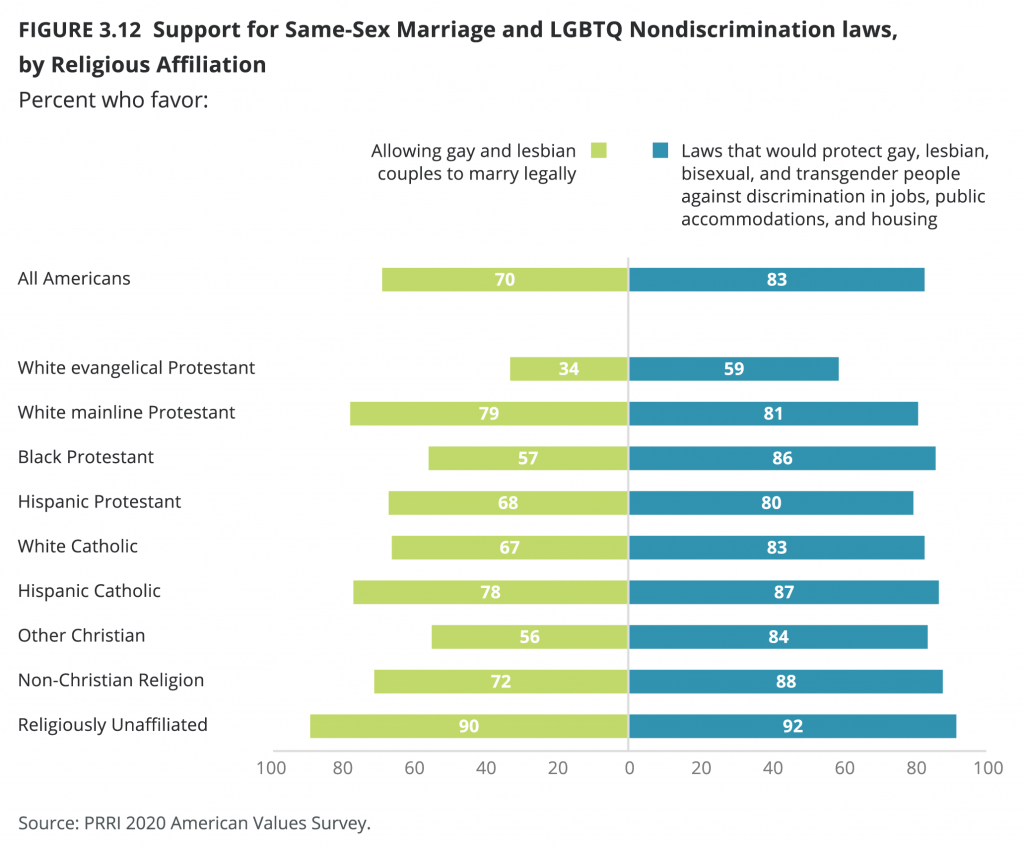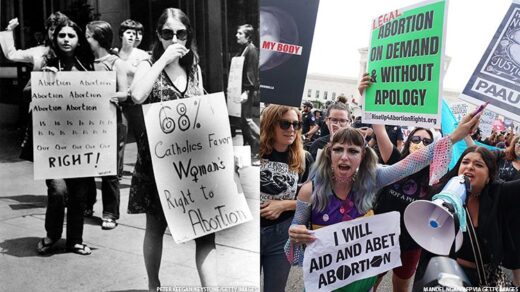A majority of Americans support marriage equality & LGBTQ protections. All except one group.
In part of surveying the country across vast, complex issues effecting the country right before the 2020 election, a survey found that a majority of Americans – 70% – “favor allowing gay and lesbian couples to marry legally.”
That’s the highest known recorded support for marriage equality in a national survey – only 28% said they were opposed.
Related: LGBTQ youth face more stress from police brutality & COVID-19
The American Values Survey, a survey put together under the American Values Atlas, itself a project of the Public Religion Research Institute (PRRI), released its findings this year after over 3,500 interviews over the last two months.
That means at least 7 of every 10 people is likely to be supportive of same-sex marriage. That’s a huge difference from the mere 11 percent in support from 1988, according to a University of Chicago poll at the time. Pro-marriage equality support has been in the majority nationally since 2009.
This is a three percent increase from the 67 percent found to be pro-marriage equality in a Gallup poll this June.
Even more encouraging, when the numbers were broken down by political or religious demographics, the support for marriage equality remained in the majority across almost every group.
Even further, more people are supportive of anti-discrimination protections for LGBTQ people than they are of same-sex marriage. PRRI reports that 83 percent of people believe these protections should be included in law, while 16 percent do not.
Politically, 80 percent of Democrats and 76 percent of independents support same-sex marriage – Republicans came in at exactly 50 percent. 94 percent of Dems, 85 percent of independents, and 68 percent of Republicans support laws preventing discrimination on sexual orientation and gender identity.
Religiously, support was high among white ‘mainline’ Protestants at 79 percent, Hispanic Roman Catholics at 78 percent, and non-Christians at 72 percent. 68 percent of Hispanic Protestants, 67 percent of white Catholics, 57 percent of Black Protestants, and 56 percent of others that classify themselves in other Christian denominations also supported marriage equality in majority.
But no religious demographic was higher in support than those unaffiliated with any religious faction – 90 percent.
White evangelical Protestants were the only demographic that had same-sex support in the minority. 63 percent of them were opposed, the survey found, while 34 percent supported. Still, a majority – 59 percent – believed in protection from discrimination for LGBTQ people.

These numbers come at a time when support for marriage equality and LGBTQ protections from discrimination increase in some places around the world, while other governments continue to implement anti-LGBTQ protections. There are now at least 29 countries and territories with some form of codified marriage equality legality, according to the Human Rights Campaign, and they believe 5 countries have a chance of progressing into that group within the year.
Just this week, Pope Francis spoke on his belief that LGBTQ people should have the right to a family.
“[Gay people are] children of God and have a right to a family,” he said in a recently-aired Italian documentary. “Nobody should be thrown out, or be made miserable because of it…what we have to create is a civil union law. That way they are legally covered.”
Unsurprisingly, the mostly-evangelical religious right took exception to that.
Still, even with a Supreme Court ruling as precedent, majority support amongst citizens, and other benefits such as its contribution to the economy, marriage equality is at risk here in the United States. It can all end in the coming years, solely dependent on if such a case is ever heard before the Supreme Court again.
At least two justices have openly expressed interest in reversing the ruling, and the judge currently up for confirmation on the high Court is historically anti-LGBTQ.
Obergefell v. Hodges, the 2015 case that legalized same-sex marriage across the country, was ruled with a 5-4 margin, with all 4 conservatives on the court issuing a dissent. They are now in a 5-3 majority, and conservatives will have a 6-3 advantage if Amy Coney Barrett is confirmed. This has led to claims by some that a repeal of marriage equality is “in sight.”
Both the plaintiff and defendant from that case have come out against Barrett’s nomination, fearing just that.
Considering this and the various other findings, PRRI’s founder, Robert P. Jones, concluded from the results that “Republicans and Democrats seem to be living in different countries.”
Actual Story on LGBTQ Nation
Author: Juwan J. Holmes





